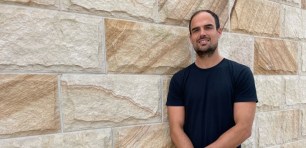
Phil Leahy (L) and Gabby Leibovich (R) at a recent Retail Global event. Source: supplied.
Phil Leahy founded Retail Global in 2005, growing it over nearly 17 years to become a leading international e-commerce conference business with sold out shows in Australia, New Zealand and the US.
At the start of November, Leahy announced he is stepping down as CEO of the company, thanking his “brilliant team” for their efforts, especially the ability to pivot when needed.
But such ability — unlike the pandemic — didn’t come about overnight. Leahy himself has been pivoting his whole career, and it would be ill to believe his approach hadn’t paid off with his staff.
For one, when the pandemic hit in 2020, Retail Global’s events (a lot which were based in the US) “got wiped out overnight” — resulting in a 75% loss of revenue.
So how did Leahy go from such a great loss in the events industry to building MedCart, Australia’s first medical marketplace?
In an interview with SmartCompany Plus, Leahy explains the process; how he found a new business opportunity in the face of a crisis; and his advice to others on how to do the same.
Key takeaways
You don’t have to know a field or industry inside and out to grow a business within it
Skills are transferable as long as you are flexible
Ideas are everywhere and they are obvious; you just need to know where to look
No matter what you do, you have to be passionate about it
Australia’s first medical marketplace
When the pandemic hit and cancelled Retail Global’s events, the team of six (which has now grown to 10) began quickly pivoting the in-person events to digital. But while doing so, they had another task at hand: setting up a social enterprise called Frontliners to deliver gestures of support to healthcare workers.
The team was in awe of healthcare workers and those on the frontline of COVID-19, they wanted to deliver care packages to show Australia’s support. With the means to do so, Leahy and his team successfully delivered care packages to more than 134,000 medical frontliners, equaling over $2.5 million worth of free goods and services.
What started out as a gesture of goodwill turned much larger than the Retail Global team anticipated — especially when they started receiving messages about PPE, how to source it, and all those other pandemic-related questions that the public would remember asking when COVID-19 first hit Australia.

The Retail Global/MedCart team. Source: supplied
Leahy decided to take a look at the whole supply chain of the medical industry, recognising that any available websites were “very disjointed and very old school”. He wanted to allow people who truly needed medical supplies to be able to reach them, and knew he had the means to do so.
That’s when he spoke with Marketplacer to partner up and said ‘look, let’s get this project off the ground’.
That so-called ‘project’ turned into MedCart, a marketplace selling vital medical equipment, PPE and healthcare supplies to help meet the shortages during the pandemic.
Leahy admits he believed that — when MedCart first launched — the pandemic was going to ease off, and so it would just end up being “good for next time”.
“But this year it’s just gone nuts,” he says.
While Leahy won’t disclose revenue figures, he does state that in the last six months, revenue has been growing “as well as 100%”.
At the time of interview, MedCart had about 2000 SKUs — including products ranging from face masks and shields to PPE and gloves, sanitisers and rapid covid testing kits — and 53 sellers, with the onboarding of about three to four additional retailers happening each week.
Its core focus — apart from being a medical supplies marketplace, of course — is to promote locally-made products, with 80% of the products supplied by Australian manufacturers.
Entrepreneur at heart
Many might think that if you’re going to look for a gap in the market and identify a new business opportunity, you’d be looking at gaps in a field you have experience in.
For Leahy, that’s not the case.
Leahy says he was indeed “freaking out” about his lack of experience in the medical field when he started MedCart, but “when you drill down to it, it’s about the retailers”.
And the retail and e-commerce space is one Leahy does have a lot of experience in. In fact, back in 2005, Leahy was the number one eBay seller in Australia.
Leahy explains that he’d worked in radio for quite some time, which meant he had a plenty of music collectables, such as signed copies of CDs. So when a friend told him about eBay, he thought he’d give it a shot.
“I put up a signed copy of Silverchair’s Frogstomp, and it sold for a hundred bucks,” Leahy says of his first eBay sale.
Turns out the music space was popular for US and UK buyers, so Leahy’s eBay offerings quickly grew — seeing him immersed in a world of e-commerce for seven years, a time in which he attended global events all over the world to meet with like-minded individuals.
The skills he learnt during that time (skills in which helped him grow Retail Global), and an understanding of the merchant side of things, is something that very much assisted with launching MedCart.
“It’s things like that,” Leahy says, of how he managed to pivot — and succeed — in a different space: “events, time, experience and relationships”.
Advice for entrepreneurs
Leahy gives an analogy to explain his advice to other entrepreneurs, on how to find opportunities even when your whole industry is disrupted.
He says that for years, when you travelled, you’d carry a suitcase — until all of a sudden someone had a great idea to put two wheels on it. Then, for years, we’d all drag around two-wheel suitcases… until someone else thought, ‘why not put four wheels on it?’
“My analogy is that these things are so obvious; there are so many obvious things out there,” Leahy summarises.
“There’s so much opportunity, and you have to find that opportunity and then be driven by that passion of finding a problem to solve, and following through on that.
“You have got to have some passion in what you’re doing.”
Leahy says it would be a real “crystal ball” situation to give advice to his 2019-self, but he knows what he’d tell others moving forward.
“I’ll just say, my advice to anyone is that, when thrown a curveball, you have to run at it. You have to run at it and not be scared.
“Any action is better [than nothing], because you’ll learn.
“So my advice is that when things go to shit: run at it.”
Handpicked for you

Social media content startup Jellysmack launches in ANZ amid a $133 billion global market boom



COMMENTS
SmartCompany is committed to hosting lively discussions. Help us keep the conversation useful, interesting and welcoming. We aim to publish comments quickly in the interest of promoting robust conversation, but we’re a small team and we deploy filters to protect against legal risk. Occasionally your comment may be held up while it is being reviewed, but we’re working as fast as we can to keep the conversation rolling.
The SmartCompany comment section is members-only content. Please subscribe to leave a comment.
The SmartCompany comment section is members-only content. Please login to leave a comment.